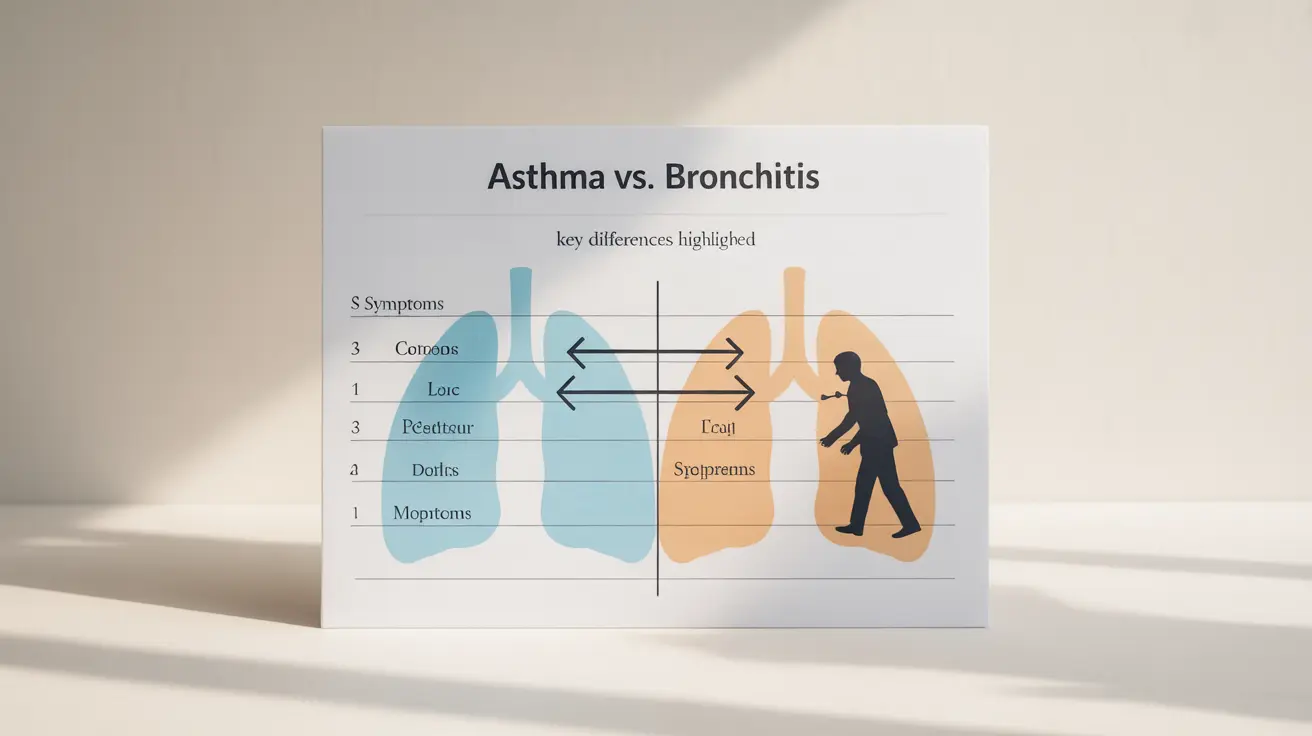When you're experiencing breathing difficulties and persistent coughing, determining whether you have asthma or bronchitis can be challenging. While these respiratory conditions share some common symptoms, they are distinct conditions requiring different approaches to treatment and management.
This comprehensive guide will help you understand the key differences between asthma and bronchitis, including their symptoms, triggers, diagnostic methods, and treatment options. Understanding these distinctions can help you seek appropriate medical care and manage your condition more effectively.
Understanding the Basic Differences
Asthma is a chronic respiratory condition characterized by inflammation and narrowing of the airways, while bronchitis involves inflammation of the bronchial tubes, often due to infection or irritation. These fundamental differences affect how each condition manifests and how they should be treated.
Distinct Symptoms and Characteristics
Asthma Symptoms
Asthma typically presents with:
- Wheezing (especially during exhalation)
- Shortness of breath
- Chest tightness
- Persistent cough, often worse at night
- Symptoms that come and go
- Quick onset of symptoms during attacks
Bronchitis Symptoms
Bronchitis usually involves:
- Productive cough with mucus
- Fatigue
- Mild fever and chills (in acute cases)
- Chest discomfort
- Gradual onset of symptoms
- Symptoms that typically last 10-14 days
Triggers and Risk Factors
Asthma Triggers
Common asthma triggers include:
- Allergens (pollen, dust mites, pet dander)
- Exercise
- Cold air
- Strong emotions or stress
- Air pollution
- Respiratory infections
Bronchitis Triggers
Bronchitis is often triggered by:
- Viral or bacterial infections
- Smoking or secondhand smoke
- Air pollution
- Workplace irritants
- Repeated exposure to lung irritants
Diagnostic Approaches
Healthcare providers use different methods to diagnose these conditions. For asthma, doctors typically perform lung function tests, including spirometry and peak flow measurements. They may also conduct allergy testing and assess response to bronchodilators.
For bronchitis, diagnosis usually involves physical examination, listening to lung sounds, and reviewing symptoms and medical history. In some cases, chest X-rays may be necessary to rule out other conditions.
Treatment Strategies
Asthma Treatment
Asthma management typically includes:
- Long-term control medications
- Quick-relief inhalers (rescue medications)
- Avoiding known triggers
- Regular monitoring and adjustment of treatment plans
- Development of an asthma action plan
Bronchitis Treatment
Bronchitis treatment usually focuses on:
- Rest and hydration
- Over-the-counter cough medications
- Humidifier use
- Antibiotics (only if bacterial infection is present)
- Smoking cessation if applicable
Frequently Asked Questions
What are the main differences between asthma and bronchitis symptoms?
Asthma typically causes wheezing, shortness of breath, and a dry cough that comes and goes, while bronchitis usually presents with a productive cough containing mucus, accompanied by fatigue and possible fever. Asthma symptoms tend to be episodic, while bronchitis symptoms are usually continuous until the condition resolves.
How can doctors diagnose whether I have asthma or bronchitis?
Doctors use different diagnostic tools for each condition. For asthma, they typically perform lung function tests, including spirometry and peak flow measurements. For bronchitis, diagnosis usually involves physical examination, listening to lung sounds, and reviewing symptoms, sometimes supplemented with chest X-rays.
What triggers asthma attacks compared to bronchitis flare-ups?
Asthma attacks are commonly triggered by allergens, exercise, cold air, and stress, while bronchitis flare-ups are typically caused by viral or bacterial infections, exposure to smoke, or other respiratory irritants.
How is the treatment for asthma different from the treatment for bronchitis?
Asthma treatment focuses on long-term control medications and quick-relief inhalers, while bronchitis treatment typically involves managing symptoms through rest, hydration, and sometimes over-the-counter medications. Bronchitis often resolves on its own, while asthma requires ongoing management.
When should I see a doctor if I have a cough that might be asthma or bronchitis?
Seek medical attention if you experience persistent coughing lasting more than two weeks, difficulty breathing, chest pain, high fever, or if your symptoms interfere with daily activities. Immediate medical care is necessary if you have severe breathing difficulties or your lips or fingernails turn blue.




